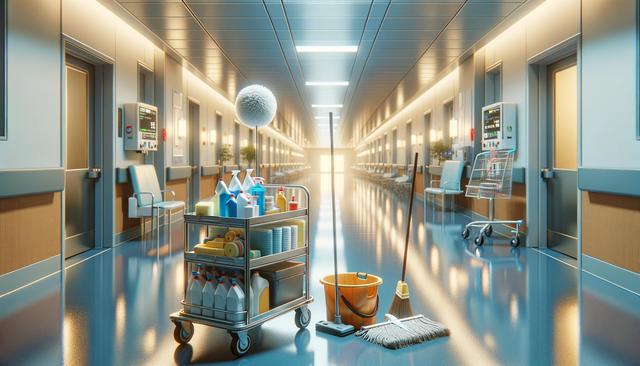The Role of Janitorial Staff in Healthcare Facilities
Hospital janitorial cleaning jobs are more than just routine maintenance—they are a frontline defense against the spread of infections. These professionals are responsible for maintaining a clean and sterile environment in areas where vulnerable patients are treated. In healthcare facilities, the risks of contamination are significantly higher due to the presence of bacteria, viruses, and other pathogens. Therefore, janitorial staff must be trained in specialized cleaning protocols tailored for hospital settings.
Unlike general commercial cleaning, hospital janitorial cleaning involves detailed procedures and strict adherence to sanitation standards. These staff members clean everything from patient rooms and surgical suites to waiting areas and restrooms, ensuring that every surface is disinfected and safe for use. Their tasks include:
- Disinfecting high-touch surfaces like bed rails, doorknobs, and light switches
- Proper disposal of medical waste and sharps
- Using hospital-grade disinfectants and cleaning equipment
- Following infection control procedures and safety regulations
These responsibilities require a strong understanding of hygiene protocols and contribute directly to the overall safety of both patients and healthcare workers.
Reducing the Risk of Hospital-Acquired Infections
Hospital-acquired infections (HAIs) are a significant concern in medical environments, and effective hospital janitorial cleaning can reduce their occurrence by up to 30%. HAIs can lead to longer hospital stays, increased medical costs, and in severe cases, patient fatalities. This makes the janitorial staff’s role crucial in infection prevention strategies.
Cleaning teams play a key role in controlling pathogens by consistently disinfecting surfaces and maintaining a clean environment. They often work in coordination with infection control departments to identify high-risk areas and implement targeted cleaning protocols. Some of the critical areas include:
- Operating rooms
- Intensive care units
- Emergency departments
- Isolation rooms
By focusing on these zones, janitorial staff help create a safer environment that supports patient recovery and reduces the risk of cross-contamination between patients, visitors, and healthcare providers.
Training and Certification Requirements
Effective hospital janitorial cleaning requires specialized training and, in many cases, certification. Cleaning in a healthcare environment demands a deep understanding of infection control, chemical handling, and safety protocols. Many hospitals provide structured training programs to ensure their cleaning staff are well-equipped to handle the unique challenges of medical settings.
Some common training topics include:
- Proper use of personal protective equipment (PPE)
- Understanding of bloodborne pathogens
- Safe handling of biohazardous materials
- Cross-contamination prevention techniques
Certification programs may also be offered through industry organizations, which help standardize cleaning practices and ensure a high level of professionalism. These qualifications can enhance a janitorial worker’s career prospects while also improving the overall quality of hospital cleaning operations.
Tools and Products Used in Hospital Cleaning
Hospital janitorial cleaning jobs rely on specialized tools and cleaning products designed to meet the high standards of healthcare facilities. These include hospital-grade disinfectants, HEPA-filter vacuums, and microfiber cleaning cloths, all of which are selected for their effectiveness in removing pathogens and preventing the spread of infection.
Cleaning teams must be trained to use these tools safely and effectively. For example, some disinfectants require a specific dwell time to kill bacteria and viruses, and improper usage can lead to reduced efficacy. Additionally, color-coded cleaning systems are often employed to prevent cross-contamination between different areas of the hospital.
Common tools and supplies include:
- Autoclaves for sterilizing reusable equipment
- Touchless cleaning systems
- Electrostatic sprayers for large-area disinfection
- Disposable mop heads and cleaning pads
These resources support efficient and thorough cleaning in environments where cleanliness can directly impact patient outcomes.
Career Outlook and Opportunities
Hospital janitorial cleaning positions offer stable employment opportunities with room for advancement. As healthcare systems continue to prioritize cleanliness and infection control, the demand for trained janitorial staff remains steady. These roles are essential and often come with benefits such as healthcare coverage, paid time off, and opportunities for professional development.
Many individuals begin in entry-level positions and work their way up to supervisory or specialized roles. With additional training, janitorial staff can transition into roles such as environmental services technicians or infection prevention aides. These positions contribute even more directly to the hospital’s operational success and patient care quality.
Key advantages of working in hospital janitorial cleaning include:
- Job stability in a growing industry
- Opportunities for skill development and certification
- Meaningful work that contributes to public health
- Collaborative work environments within healthcare teams
For individuals seeking a career that combines practical skills with a strong sense of purpose, hospital janitorial roles present a valuable and impactful path.
Conclusion
Hospital janitorial cleaning jobs are far more than maintenance work—they are an essential part of the healthcare system. By ensuring that hospitals remain clean and free of harmful pathogens, janitorial staff play a crucial role in protecting both patients and medical personnel. Their work helps to reduce hospital-acquired infections, supports recovery, and upholds the overall quality of care. For those interested in meaningful employment that directly impacts community health, hospital janitorial positions offer a rewarding and important career path.






